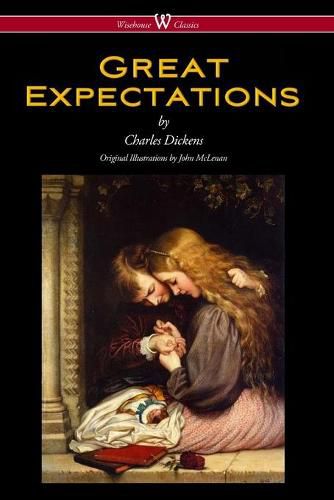Readings Newsletter
Become a Readings Member to make your shopping experience even easier.
Sign in or sign up for free!
You’re not far away from qualifying for FREE standard shipping within Australia
You’ve qualified for FREE standard shipping within Australia
The cart is loading…






This title is printed to order. This book may have been self-published. If so, we cannot guarantee the quality of the content. In the main most books will have gone through the editing process however some may not. We therefore suggest that you be aware of this before ordering this book. If in doubt check either the author or publisher’s details as we are unable to accept any returns unless they are faulty. Please contact us if you have any questions.
GREAT EXPECTATIONS is Charles Dickens’ thirteenth novel and his penultimate completed novel; a bildungsroman which depicts the personal growth and personal development of an orphan nicknamed Pip. It is Dickens’s second novel, after David Copperfield, to be fully narrated in the first person. The novel was first published as a serial in Dickens’s weekly periodical All the Year Round, from 1 December 1860 to August 1861. In October 1861, Chapman and Hall published the novel in three volumes.
It is set among marshes in Kent, and in London, in the early to mid-1800s, and contains some of Dickens’ most memorable scenes, including the opening, in a graveyard, where the young Pip is accosted by the escaped convict, Abel Magwitch. GREAT EXPECTATIONS is full of extreme imagery -poverty; prison ships and chains, and fights to the death-and has a colorful cast of characters who have entered popular culture. Dickens’s themes include wealth and poverty, love and rejection, and the eventual triumph of good over evil. GREAT EXPECTATIONS is popular both with readers and literary critics, and has been translated into many languages, and adapted numerous times into various media.
Upon its release, the novel received near universal acclaim. Thomas Carlyle spoke disparagingly of all that Pip’s nonsense . Later, George Bernard Shaw praised the novel, as All of one piece and consistently truthful. During the serial publication, Dickens was pleased with public response to GREAT EXPECTATIONS and its sales; when the plot first formed in his mind, he called it a very fine, new and grotesque idea. (more on www.wisehouse-classics.com)
$9.00 standard shipping within Australia
FREE standard shipping within Australia for orders over $100.00
Express & International shipping calculated at checkout
This title is printed to order. This book may have been self-published. If so, we cannot guarantee the quality of the content. In the main most books will have gone through the editing process however some may not. We therefore suggest that you be aware of this before ordering this book. If in doubt check either the author or publisher’s details as we are unable to accept any returns unless they are faulty. Please contact us if you have any questions.
GREAT EXPECTATIONS is Charles Dickens’ thirteenth novel and his penultimate completed novel; a bildungsroman which depicts the personal growth and personal development of an orphan nicknamed Pip. It is Dickens’s second novel, after David Copperfield, to be fully narrated in the first person. The novel was first published as a serial in Dickens’s weekly periodical All the Year Round, from 1 December 1860 to August 1861. In October 1861, Chapman and Hall published the novel in three volumes.
It is set among marshes in Kent, and in London, in the early to mid-1800s, and contains some of Dickens’ most memorable scenes, including the opening, in a graveyard, where the young Pip is accosted by the escaped convict, Abel Magwitch. GREAT EXPECTATIONS is full of extreme imagery -poverty; prison ships and chains, and fights to the death-and has a colorful cast of characters who have entered popular culture. Dickens’s themes include wealth and poverty, love and rejection, and the eventual triumph of good over evil. GREAT EXPECTATIONS is popular both with readers and literary critics, and has been translated into many languages, and adapted numerous times into various media.
Upon its release, the novel received near universal acclaim. Thomas Carlyle spoke disparagingly of all that Pip’s nonsense . Later, George Bernard Shaw praised the novel, as All of one piece and consistently truthful. During the serial publication, Dickens was pleased with public response to GREAT EXPECTATIONS and its sales; when the plot first formed in his mind, he called it a very fine, new and grotesque idea. (more on www.wisehouse-classics.com)